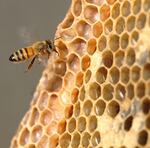A persistent disease is killing honeybees, affecting farmers across the U.S. Now, a team of researchers — including several from Oregon State University — is on the case.

With the help of a recent federal grant, OSU is teaming up with three other universities to investigate a bacteria that turns honeybee larvae to mush.
Lynn Ketchum / Oregon State University
OSU is teaming up with three other universities, with funding from the U.S. Department of Agriculture, to investigate European foulbrood disease. It’s a bacteria that can turn honeybee larvae to mush. It’s become a serious problem for beekeepers and farmers over the past six to seven years.
Professor Ramesh Sagili leads the team at OSU. “Honeybees are really critical pollinators, and our food production is dependent on them, their health and well-being,” he said.
The four-year study will track over 1,500 commercial bee colonies as they pollinate bee-dependent crops like highland blueberries and almonds in Washington, Oregon, California and Mississippi. Researchers are looking for the disease and for the factors that might make some bees more vulnerable to infection.
The study is focused on western honeybees, the most prolific pollinator in the United States. Sagili said researchers estimate at least one-third of food grown in the U.S. relies on honeybee pollination.
Unfortunately, about 30% of commercial colonies in the U.S. are lost each year from a combination of stressors and diseases. Those losses hurt yields for crops that rely on the intrepid insects.
The comprehensive, longitudinal study aims to understand all the contributing factors for European foulbrood disease. Researchers hope to use the information to develop strategies to pass on to beekeepers and farmers, keeping bee colonies and crops healthy.